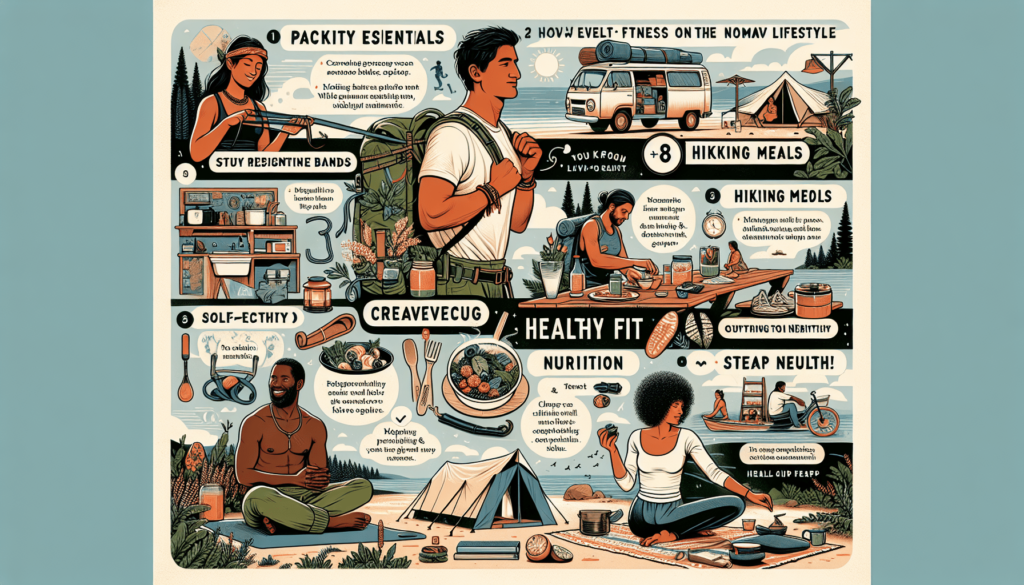Are you constantly on the move, living a nomadic lifestyle? While it can be exhilarating and fulfilling, it can also pose challenges when it comes to maintaining a healthy and active lifestyle. In this article, we will explore practical tips and strategies on how to stay fit and take care of your well-being while embracing the nomadic life. From finding creative ways to exercise in new environments to prioritizing nutritious meals on the go, we’ve got you covered. So, if you’re ready to stay fit and energized while traversing the world, keep reading!

Finding Active Hobbies
Engage in outdoor activities
When living a nomadic lifestyle, it’s important to find hobbies that keep you active and fit. Engaging in outdoor activities can be a great way to do this. Whether it’s hiking in a national park, going for a swim at the beach, or playing a game of frisbee in a local park, being outdoors allows you to enjoy the beauty of nature while also getting your heart rate up. Plus, it’s a great way to explore your new surroundings and discover hidden gems.
Try new sports or activities
Another fun way to stay fit while living nomadically is by trying new sports or activities. From surfing to stand-up paddleboarding, from yoga to rock climbing, there are endless options to choose from. Trying new things not only keeps your workouts exciting and challenging but also helps you meet new people and expand your social circle. You never know, you might discover a new passion or talent along the way!
Do bodyweight exercises
When you’re constantly on the move, finding a gym or fitness facility may not always be feasible. That’s where bodyweight exercises come in handy. Bodyweight exercises use your own body as resistance and can be done anywhere, anytime. From push-ups and squats to planks and lunges, there are numerous bodyweight exercises that target different muscle groups. Incorporate a few sets of these exercises into your daily routine to stay fit and strengthen your muscles. Plus, they require no equipment, making them ideal for a nomadic lifestyle.
Creating a Workout Routine
Utilize online workout programs
If you prefer a more structured approach to fitness, utilizing online workout programs can be a great option. There are countless websites and fitness influencers who offer workout programs for all fitness levels and goals. Some programs require little to no equipment, while others may involve the use of resistance bands or small weights. By following a workout program, you can ensure that you’re targeting different muscle groups and progressing in your fitness journey.
Use fitness apps
In addition to online workout programs, fitness apps are another convenient tool for staying fit while living a nomadic lifestyle. These apps often offer a variety of workout routines, ranging from cardio and strength training to yoga and meditation. Many apps also provide tracking features, allowing you to monitor your progress and set reminders for your workouts. With a wide selection of fitness apps available, you can easily find one that suits your preferences and fits your schedule.
Set achievable goals
Setting achievable goals is key to staying motivated and committed to your fitness routine. When living a nomadic lifestyle, your goals may vary depending on your current location and circumstances. Whether it’s completing a 5k run, mastering a challenging yoga pose, or simply maintaining a consistent exercise routine, make sure your goals are realistic and attainable. This will not only help you stay focused but also give you a sense of accomplishment when you achieve them.
Incorporating Exercise into Daily Life
Walk or bike to explore new places
One of the simplest yet effective ways to incorporate exercise into your daily life is by opting to walk or bike whenever possible. Instead of taking public transportation or driving, consider using your own two feet or a bicycle to explore your new surroundings. Not only will this help you stay active, but it will also allow you to take in the sights and sounds of your new environment at a leisurely pace. Plus, it’s a great way to save money and reduce your carbon footprint.
Take advantage of local fitness facilities
While it may not always be possible to find a gym or fitness facility in every location, there are often alternatives available. Many cities and towns have public parks with outdoor fitness equipment, such as pull-up bars and parallel bars. Additionally, some hotels or hostels offer on-site fitness facilities or have partnerships with nearby gyms. Take advantage of these options whenever they’re available to ensure you have access to the equipment and amenities you need to maintain your fitness routine.
Make use of your surroundings for workouts
Living a nomadic lifestyle often means being surrounded by diverse landscapes and natural elements. Take advantage of your surroundings by incorporating them into your workouts. For example, if you’re near a beach, try running or doing yoga on the sand. If you’re in a mountainous region, go for a hike or try rock climbing. By adapting your workouts to the environment, you not only stay fit but also get to fully immerse yourself in the unique experiences each location has to offer.
Maintaining a Healthy Diet
Plan meals in advance
Maintaining a healthy diet can be challenging when living a nomadic lifestyle, but with some planning, it’s definitely possible. Before heading to a new location, take some time to research local markets, grocery stores, and restaurants that offer healthy options. Plan your meals in advance, ensuring that you have access to nutritious ingredients and snacks. Consider meal prepping when possible, so you can have healthy meals even on days when you’re on the go.
Cook your own meals
One of the best ways to have control over your diet is by cooking your own meals. While eating out can be convenient and tempting, it’s often difficult to know exactly what ingredients are used and how the food is prepared. By cooking your own meals, you can choose healthier ingredients, control portion sizes, and experiment with new recipes. Look for accommodations that have kitchen facilities or stay in places that allow you to cook your own meals, such as campgrounds or vacation rentals.
Opt for nutritious options when eating out
Of course, there will be times when eating out is unavoidable. When dining at restaurants, opt for nutritious options on the menu. Look for dishes that are high in lean protein, whole grains, and vegetables. Avoid deep-fried or heavily processed foods, and instead, opt for grilled, steamed, or baked options. Don’t be afraid to ask for modifications or substitutions to make a dish healthier. It’s also a good idea to carry some healthy snacks with you, such as nuts or fruit, to avoid unhealthy temptations while on the go.

Staying Hydrated
Carry a reusable water bottle
Staying properly hydrated is crucial for maintaining overall health and well-being. When living a nomadic lifestyle, it’s important to always have access to water. Carry a reusable water bottle with you at all times, and make it a habit to refill it whenever you come across a water source. This way, you’ll never be caught without water, and you’ll also be reducing your environmental impact by avoiding single-use plastic bottles.
Drink water regularly throughout the day
In addition to carrying a reusable water bottle, make it a priority to drink water regularly throughout the day. Aim to drink at least 8 cups (64 ounces) of water per day, or more if you’re active or in a hot climate. Staying hydrated not only helps maintain bodily functions but also improves exercise performance and aids in digestion. Set reminders on your phone or use a water tracking app to ensure that you’re meeting your daily hydration goals.
Limit consumption of sugary and alcoholic beverages
While it’s important to stay hydrated, it’s equally important to be mindful of the types of beverages you consume. Sugary drinks, such as soda and fruit juices, can be high in calories and lead to weight gain and other health issues. Similarly, excessive alcohol consumption can have negative effects on your health and fitness goals. Opt for water, unsweetened tea, or infused water as your go-to beverages, and enjoy sugary or alcoholic beverages in moderation.
Getting Sufficient Rest
Establish a regular sleep schedule
Getting sufficient rest is essential for allowing your body to recover and recharge. Establish a regular sleep schedule by going to bed and waking up at consistent times, even if your daily activities may vary. Aim for 7-9 hours of quality sleep per night to ensure that you wake up feeling refreshed and energized. Creating a sleep routine can also signal to your body that it’s time to wind down and prepare for sleep.
Create a comfortable sleep environment
When you’re constantly on the move, creating a comfortable sleep environment can make a big difference. Invest in a quality mattress or sleeping pad that provides adequate support. Use blackout curtains or an eye mask to block out any unwanted light. Consider using earplugs or white noise machines to minimize disruptions from noise. Having a comfortable sleep environment can improve the quality of your sleep, leading to better overall health and well-being.
Practice relaxation techniques
Life on the road can sometimes be stressful, so it’s important to find ways to relax and unwind. Incorporate relaxation techniques into your daily routine to help reduce stress and promote better sleep. Techniques such as deep breathing exercises, meditation, and gentle stretching can help calm your mind and relax your body. Look for mindfulness apps or guided meditation videos to assist you in practicing these techniques, even if you’re new to them.
Managing Stress Levels
Engage in mindfulness activities
Mindfulness activities can help you manage stress and improve your overall well-being. Activities such as yoga, tai chi, and meditation can help you focus on the present moment, reduce anxiety, and promote mental clarity. Find a quiet space or a peaceful outdoor area to engage in these activities. Even just a few minutes of mindfulness practice each day can have a significant impact on your stress levels and overall mindset.
Find ways to unwind and relax
In addition to mindfulness activities, it’s important to find other ways to unwind and relax. Engage in activities that bring you joy and help you disconnect from the demands of daily life. This could be reading a book, listening to music, journaling, or practicing a hobby. Make time for these activities regularly, even if it’s just for a short period each day. Having moments of relaxation and enjoyment can help you recharge and better cope with the challenges of a nomadic lifestyle.
Connect with fellow nomads for support
Living a nomadic lifestyle can sometimes feel isolating, especially when faced with stress or uncertainty. Connecting with fellow nomads can provide a sense of support and understanding. Seek out online communities or social media groups where you can share experiences, ask for advice, and find companionship. By connecting with others who are going through similar experiences, you can gain valuable insights and feel a sense of belonging.
Maintaining Mental Well-being
Stay connected with loved ones
When living a nomadic lifestyle, it’s easy to become disconnected from loved ones. However, maintaining strong social connections is essential for mental well-being. Make an effort to stay in touch with family and friends through phone calls, video chats, or even letters. Share your experiences and reach out for support when needed. Having a support system in place can provide comfort and reassurance during challenging times.
Continue learning and stimulating your mind
Keeping your mind active and stimulated is important for mental well-being. When living a nomadic lifestyle, take advantage of the opportunity to learn about different cultures, languages, and histories. Visit museums, attend local festivals, or participate in workshops and classes. Engaging in intellectual pursuits can not only expand your knowledge but also ignite your curiosity and passion for lifelong learning.
Practice gratitude and positive thinking
A positive mindset can have a profound impact on your mental well-being. When faced with challenges or setbacks, practice gratitude and positive thinking. Take a moment each day to reflect on the things you’re grateful for, whether it’s a beautiful sunset, a kind gesture from a stranger, or a memorable experience. Shift your focus to the positive aspects of your nomadic lifestyle, such as the freedom to explore new places and the opportunity for personal growth. Cultivating a positive mindset can help you navigate the ups and downs of life on the road with resilience and optimism.
Taking Care of Your Posture
Use ergonomic equipment
When living a nomadic lifestyle, it’s important to take care of your posture, especially if you spend long hours working remotely or traveling. Invest in ergonomic equipment such as a supportive chair, an adjustable desk, or a laptop stand. These tools can help you maintain good posture and reduce the risk of developing musculoskeletal issues. Additionally, consider using a supportive backpack or suitcase to distribute weight evenly and minimize strain on your shoulders and back.
Stretch and exercise to improve posture
Regular stretching and exercises can help improve your posture and counteract the effects of long periods of sitting or standing. Incorporate exercises that focus on strengthening your core muscles, such as planks and back extensions. Stretching exercises that target tight muscles, such as the chest and hip flexors, can also help alleviate tension and improve posture. Set reminders throughout the day to take short breaks and perform these exercises to keep your body aligned and pain-free.
Be mindful of your sitting and standing positions
Whether you’re working on a laptop, enjoying a meal, or simply relaxing, be mindful of your sitting and standing positions. Sit with your feet flat on the floor, your back supported, and your shoulders relaxed. Avoid slouching or leaning forward for extended periods of time. When standing, distribute your weight evenly on both feet and engage your core muscles to maintain stability. Make it a habit to check your posture throughout the day and correct any misalignments to avoid discomfort and promote a healthy spine.
Prioritizing Self-Care
Practice good hygiene
Self-care goes beyond fitness and nutrition. Practicing good hygiene is an important aspect of maintaining overall health and well-being. Make sure to prioritize daily hygiene habits such as brushing your teeth, showering regularly, and washing your hands. Keep personal care items stocked and easily accessible, even when on the road. By taking care of your physical well-being, you’re also promoting mental and emotional well-being.
Take time for self-reflection and self-care activities
Living a nomadic lifestyle can be exciting and fast-paced, but it’s important to take time for self-reflection and self-care activities. Schedule moments of solitude to reflect on your experiences, thoughts, and emotions. Engage in activities that bring you joy and relaxation, such as reading a book, taking a bubble bath, or practicing a creative outlet. Prioritizing self-care allows you to recharge your energy, reduce stress, and maintain a healthy balance in your nomadic lifestyle.
Make time for hobbies and personal interests
Lastly, don’t forget to make time for hobbies and personal interests. Engaging in activities that bring you fulfillment and allow you to express yourself is vital for overall well-being. Whether it’s playing an instrument, painting, photography, or cooking, carve out time in your schedule to pursue these hobbies. They not only provide a sense of joy and accomplishment but also help you maintain a sense of identity and purpose amidst the ever-changing nature of a nomadic lifestyle.
In conclusion, staying fit while living a nomadic lifestyle requires intention and adaptability. By actively seeking out active hobbies, incorporating exercise into daily life, prioritizing self-care, and maintaining a healthy diet and lifestyle, you can ensure that your physical and mental well-being are taken care of even while on the move. Embrace the opportunities that come with a nomadic lifestyle and make choices that support your health and happiness. Remember, staying fit is not only about physical fitness but also about nourishing your mind and soul.

